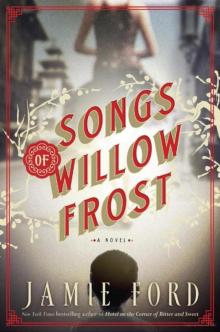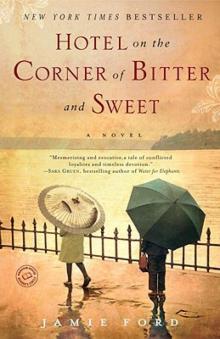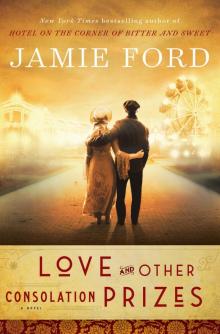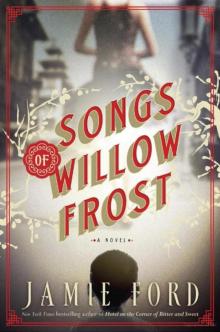- Home
- Jamie Ford
Hotel on the Corner of Bitter and Sweet Page 5
Hotel on the Corner of Bitter and Sweet Read online
Page 5
Henry
nodded.
"We made sure to place your flowers right next to her picture--she was a lovely woman, Henry. I'm sure she's in a happier place, but hardly one as beautiful." Clarence handed Henry a small white envelope. "In case you don't remember after the service--take it, just in case."
Henry felt the quarter inside. He held the envelope to his nose and could smell the peppermint among the wet, fragrant scents of the floral-filled room. "Thank you" was all he could muster.
Now, standing in the misty rain of Lake View Cemetery, Henry touched the envelope to his nose again. He couldn't smell a thing.
"I'm sorry I haven't been here as often as I should have," he apologized. He held the quarter in his hand, putting the envelope in his pocket. He listened to the sound of the wind blowing through the trees--never really expecting an answer, but always open to the possibility.
"I have some things I need to do. And, well, I just wanted to come by and tell you first. But, you probably know all this." Henry's attention drifted to the marker next to Ethel's--it was his parents'. Then he looked back to where Ethel lay. "You always knew me so well."
Henry brushed the graying hair from his temples, wet from the drizzly rain.
"I'm getting by. But I'm worried about Marty. I've always worried about him. I guess I'd ask that you look out for him--me, I can look out for myself I'll be okay."
Henry looked around to see if anyone might be watching him having this odd, one-way conversation. He was all alone--he wasn't even sure if Ethel was listening. It was one thing to talk to her at home, where she'd lived. But out here, in the cold ground next to his parents, she was certainly gone. Still, Henry had needed to come out to say good-bye.
He kissed the quarter and placed it on top of Ethel's headstone. This was our promise of happiness, Henry thought. It's all I have left to give. This is so you can be
happy without me.
He stood back, hands at his sides, and took three deep bows out of respect.
"I have to go now," Henry said.
Before he left, he drew a lily from Ethel's bundle of flowers and set it on his mother's grave. He even brushed a few leaves from his father's stone before opening his umbrella and walking back down the hill in the direction of Volunteer Park.
He took the long way back, down a winding path that lead to the near-empty parking lot. Lake View Cemetery was a beautiful place, despite the somber graves that stood as cold reminders of so much loss and longing. The final resting place of Chief Seattle's daughter and other notables like Asa Mercer and Henry Yesler, it was a walking tour of Seattle's forgotten history. Not unlike the Nisei War Memorial Monument in the northeast corner. It was a smaller monument, smaller than the headstones of members of the Nordstrom family, dedicated to Japanese American veterans--locals who'd died fighting the Germans. These days it went all but unnoticed, except by Henry, who tipped his hat as he slowly walked by.
Speak Your American
(1942)
Henry stood in front of the mirror, examining his school clothes. He'd asked his mother to iron them, but they still looked wrinkled. He tried on an old Seattle Indians baseball cap, then thought better of it, combing his hair yet again. Anxiety about Monday mornings was nothing new. In fact, it normally began on Sunday afternoons.
Even though he was used to his routine at Rainier Elementary, his stomach would knot up as the hours passed, each minute bringing him closer to his return to the all-white school-
-the bullies, the heckling, and his lunch duties in the cafeteria with Mrs. Beatty This Monday morning, though, his ritual of serving the other kids seemed downright exciting.
Those forty precious minutes in the kitchen had become time well spent, since he'd get to see Keiko. Silver lining? Indeed.
"You one big smile this morning, Henry," his father commented in Chinese, slurping his jook--thick rice soup, mixed with diced preserved cabbage. Not a favorite of Henry's, but he ate it politely.
Henry took slices of preserved duck egg out of his own bowl and set them in his mother's before she returned from the kitchen. He liked the salty slices but knew they were her favorite, and she never saved much for herself anyway. On their dark cherrywood table sat a lazy Susan used for serving; he spun it back to its original position just as his mother was returning, her bowl back in front of her.
His father's eyes peeked over his newspaper. The front-page headline read: BRITISH EVACUATE RANGOON. "You liking you school now? Hah?" His father spoke as he turned the page.
Henry, knowing not to speak Cantonese at home, answered with a nod.
"They fix the stairs, hah? The ones you fell down?" Again, Henry nodded, acknowledging his father's Cantonese, and kept eating his thick breakfast soup. He listened to his father during these lopsided, one-way conversations, but he never talked back. In fact, Henry rarely talked at all, except in English to acknowledge his advancing skills. But since his father understood only Cantonese and a little Mandarin, the conversations came as waves, back and forth, tidal shores of separate oceans.
The truth was that Henry had been beaten up by Chaz Preston on that first day of school. But his parents wanted him there so much that not being appreciative would have been a terrible insult. So Henry made up some excuse, speaking his American. Of course his parents didn't understand--imploring him to be more careful next time. Henry did his best to respect and honor his parents. He walked to school each day, going upstream against a sea of Chinese kids who called him "white devil." He worked in the school kitchen as white devils called him "yellow." But that was okay. I'll do what I have to, Henry thought. But along the way, I think I'm tired of being careful.
Finishing his breakfast, he thanked his mother and gathered his books for school.
Each had a newly wrapped cover--made from folded jazz-club flyers.
After school that Wednesday, Henry and Keiko did their work duties. Emptied the trash in the classrooms. Pounded erasers. Then they waited for the danger to subside.
Chaz and Denny Brown were responsible for retiring the flag each day, which kept them around a little longer than usual. But it'd been thirty minutes since the final bell, and they were nowhere to be seen. Henry gave the all clear to Keiko, who hid in the girls' restroom while Henry scouted the parking lot.
Except for the normal janitorial crew, he and Keiko were typically the last to leave. And today was no different. They walked side by side, down the stairs and past the naked flagpole, dangling their book bags beside them.
Henry noticed Keiko's sketchbook, the one she'd had in the park, in her book bag.
"Who taught you how to draw?" he asked. And draw so well, Henry thought, with just a hint of jealousy, secretly admiring her talent.
Keiko shrugged. "My mother, I suppose--mainly. She was an artist when she was about my age. She dreamed of going to New York City and working in a gallery. But she has pain in her hands now and doesn't draw or paint as much, so she gave her art supplies to me. She wants me to go to college at the Cornish Institute on Capitol Hill--that's an art school, you know."
Henry had heard of Cornish, a four-year academy for fine artists, musicians, and dancers. It was a fancy place. A prestigious place. He was impressed. He'd never known a real artist, except for maybe Sheldon, still ... "They won't take you."
Keiko stopped in her tracks, turning to Henry. "Why not? Because I'm a girl?"
Sometimes Henry's mouth was too big for his face. He didn't know a delicate way around the subject, so he just said what he was thinking. "They won't take you 'cause you're Japanese."
"That's why my mom wants me to apply there. To be the first." Keiko kept walking, leaving Henry a few steps behind. "Speaking of my mother, I asked her what Oai deki te ureshii desu means," Keiko said.
Henry walked a step behind, looking around nervously. He noticed Keiko's flowered dress. For someone who appeared so sweet, she sure seemed to know how to needle him. "It was Sheldon's dumb idea," he said.
"It was a nice
thing to say." Keiko paused, as if looking at a group of seagulls sweeping by overhead, then looked back at Henry, who caught a glint of mischief in her eyes. "Thank you, and Sheldon." She smiled and continued walking.
As they approached Sheldon's usual corner, there was no music, no crowd, and no sign of the sax player anywhere. He normally played across from the Rainier Heat & Power building, its entrance still covered in sandbags from bombing jitters earlier in the year. Tourists walked by as though he'd never existed. Henry and Keiko looked at each other, wondering.
"He was here this morning," Henry said. "He mentioned that his try-out at the Black Elks Club went well. Maybe he got called back?" Maybe he'd landed a regular gig with Oscar Holden, who Sheldon said had regular practice jams on Monday and Wednesday nights. They were free, so a lot of people popped in and played or just enjoyed the music.
Henry stood on the corner, looking up at neon signs marking the jazz clubs that lined both sides of Jackson Street.
"How late do your parents let you play outside?" he asked, looking at the horizon, trying to find the sun hidden somewhere behind the dense, overcast haze of Seattle's waterfront.
"I don't know, I usually take my sketchbook, so until it gets dark, I guess."
Henry looked up at the Black Elks Club, wondering what time Sheldon might be playing. "Mine too. My mother does the dishes and then relaxes, and my father settles in with the newspaper and listens to the news on the radio."
That left Henry with a few hours. Still, evenings could be a dangerous time to be walking the streets. Since so many drivers had painted their headlights blue or covered them with cellophane to comply with blackout restrictions, accidents--either head-on collisions or people simply being run over crossing the street at night--were on the rise.
Seattle's thick fog, which slowed down traffic on the streets and made trouble for the ships sailing in and out of Elliott Bay, had become a blanket of comfort, hiding homes and buildings from phantom Japanese bombers or artillery from suspected Japanese submarines. It seemed like there was danger everywhere, from drunken sailors behind the wheel, Japanese saboteurs, and worst of all, his own parents if they caught him.
"I want to go," Keiko insisted. She looked at Henry, then up the street toward the row of jazz clubs. She brushed the hair out of her eyes, looking like she'd already made up her mind about a question he hadn't even asked.
"You don't even know what I'm thinking."
"If you're going to go listen to him play, I'm coming with you."
Henry thought about it. He'd already bent the rules by spending time in Nihonmachi, so why not head up Jackson and see the sights, maybe even hear the songs?
It would be okay, as long as they weren't seen, and as long as they made it home before dark. "We're not going anywhere together. My dad will kill me. But if you want to meet me in front of the Black Elks Club at six o'clock, after dinner, I'll be there."
"Don't be late," Keiko replied.
He walked with her through Nihonmachi, the route they always took. Henry had no clue how they'd actually get into the Black Elks Club. One, they weren't black. Even if he replaced the button he wore with one that said "I am Negro," it wasn't going to cut it.
And two, they probably weren't old enough, although he thought he'd seen entire families--young kids in tow--go inside. But that was only on certain nights. Like bingo night at the Bing Kung Benevolent Association. All he knew was that he'd figure it out.
They would listen from the street if they had to. It was only a few blocks over, a little farther for Keiko, but not too far. Close to home but a world away--from his parents'
world anyway.
"Why do you like jazz so much?" Keiko asked.
"I don't know," Henry said. And he didn't, really. "Maybe because it's so different, but people everywhere still like it, they just accept musicians, no matter what color they are. Plus, my father hates it."
"Why does he hate it?"
"Because
it's
too different, I guess."
As they reached Keiko's apartment building, Henry waved good-bye and turned toward home. Walking away, he watched Keiko's reflection in the side mirror of a parked car. She looked over her shoulder and smiled. Caught peeking, he turned his head and cut through the vacant lot behind Nichibei Publishing and past the Naruto-Yu, a Japanese sento-- bathhouse. Henry couldn't picture bathing with his parents the way some Japanese families did. He couldn't picture himself doing a lot of things with his parents. He wondered about Keiko's own family--and what they might think of her sneaking out to a jazz club, let alone to meet Henry. He felt his stomach turn a little. His heart raced when he thought about Keiko, but his gut tightened just the same.
In the distance, he heard the faint sound of jazz musicians warming up.
Jamaican Ginger
(1942)
When Keiko arrived outside the Black Elks Club, Henry immediately felt underdressed. Basically, he wore the same clothes he'd had on earlier in the day, the "I am Chinese" button still pinned to his school shirt. Keiko, though, had dressed for the occasion and had on a bright pink dress and shiny brown leather shoes. Her hair, which had been pulled back and bobbed with pins and hot rollers, now hung in swoopy curls to her shoulders. She wrapped herself in a white sweater she said her mother had knitted.
Her sketchbook was tucked neatly beneath her arm.
Dumbfounded, Henry said the first thing that came to his mind. "You look beautiful." He said it in English, watching Keiko beam, astonished at how different she looked, only vaguely resembling the silly apron-wearing girl from the school kitchen.
"No Japanese? No oai deki te ureshii desu?" she teased.
"I'm
speechless."
Keiko returned his smile. "Do we just go in?"
"We can't." Henry shook his head and pointed to a sign that read "No Minors Allowed After 6:00 P.M." "They're serving booze. We're too young. But I've got an idea.
Follow me." He pointed to the alley, where he and Keiko looped around, finding the back door. It was framed with thick glass blocks, but music emanated from the screen door, which was slightly ajar.
"Are we sneaking in?" Keiko asked, concerned.
Henry shook his head. "They're bound to see us and toss us." Instead he scrounged up a pair of wooden milk crates, and they both sat down, listening to the music, ignoring the pungent smells of beer and mold in the alley. I can't believe I'm here, Henry thought. The sun was still out, and the music was brisk and lively.
After the first fifteen-minute set, the screen door creaked open and an old black man stepped out to light a cigarette. Startled, Henry and Keiko jumped up to run; they were sure they would be shooed away for loitering.
"What are you kids doing hanging out back here, trying to scare the bejeezus out of this old man?" He patted his chest above his heart, then sat down where Henry had been sitting. The rumpled old man wore long trousers, held up by gray suspenders, over a wrinkled button-down shirt, the sleeves rolled up. To Henry, he looked like an unmade bed.
"Sorry," Keiko offered, flattening out the wrinkles in her dress. "We were just listening to the music--we were just about to leave--"
Henry interrupted. "Is Sheldon playing with the band tonight?"
"Sheldon who? We got a lot of new faces in there tonight, son."
"He plays the saxophone."
The old man wiped his sweaty hands on his pants and lit his smoke. Hacking and coughing, he puffed away as if it were a competition and he was the losing team working toward a comeback. Henry listened as the old man caught his breath between draws.
"He's in there, doing a fine job--you a fan of his or something?"
"I'm just a friend--and I wanted to come down and hear Oscar Holden. I'm a fan of Oscar's."
"Me too," Keiko added, getting swept up in the moment, crowding close to Henry.
The old man stubbed his cigarette out on the worn heel of his shoe, then tossed the butt in the nearest garbage can. "You a
fan of Oscar's, huh?" He pointed at Henry's button. "Oscar got an all-Chinese fan club these days?"
Henry covered the button with his coat. "This is just ... my father's ..."
"It's okay, kid, some days I wish I was Chinese too." The old man laughed a gravelly smoker's laugh that trailed into a cough, wheezing and spitting on the ground.
"Well, if you're friends of Sheldon the Sax Man and fans of Oscar the Piano Man, I figure Oscar probably wouldn't mind having a couple little kids from the fan club in his house tonight. Now you won't tell no one about this, will you?"
Henry looked at Keiko, unsure if the old man was kidding or not. She just kept smiling; her eager grin was larger than his. Both shook their heads no. "We won't tell a soul," Keiko promised.
"Great. I need you two fan club kids to do me a little favor if you want admittance to the club tonight."
Henry deflated a bit as he watched the old man take some slips of paper out of his shirt pocket, handing one to each of them. He compared his note with Keiko's. They were almost identical. Some sort of scribbled writing and a signature--from a doctor.

 Songs of Willow Frost
Songs of Willow Frost Hotel on the Corner of Bitter and Sweet
Hotel on the Corner of Bitter and Sweet Love and Other Consolation Prizes
Love and Other Consolation Prizes Songs of Willow Frost: A Novel
Songs of Willow Frost: A Novel